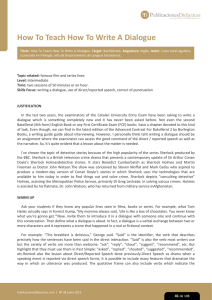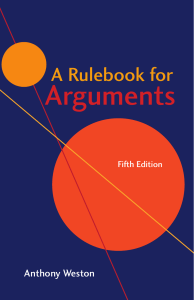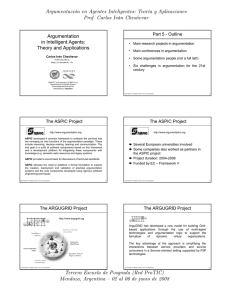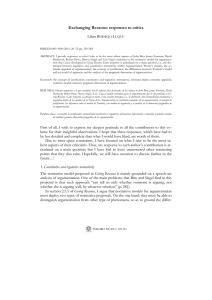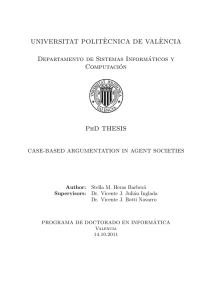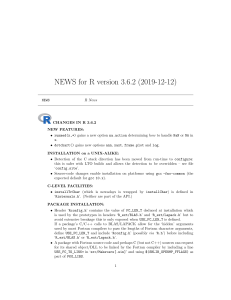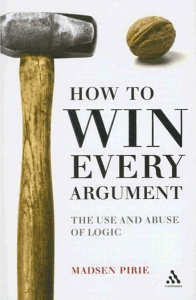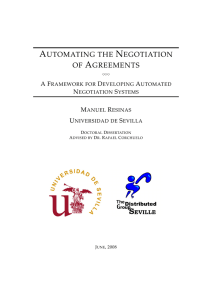Uses of arguments and negotiation - SelectedWorks
Anuncio
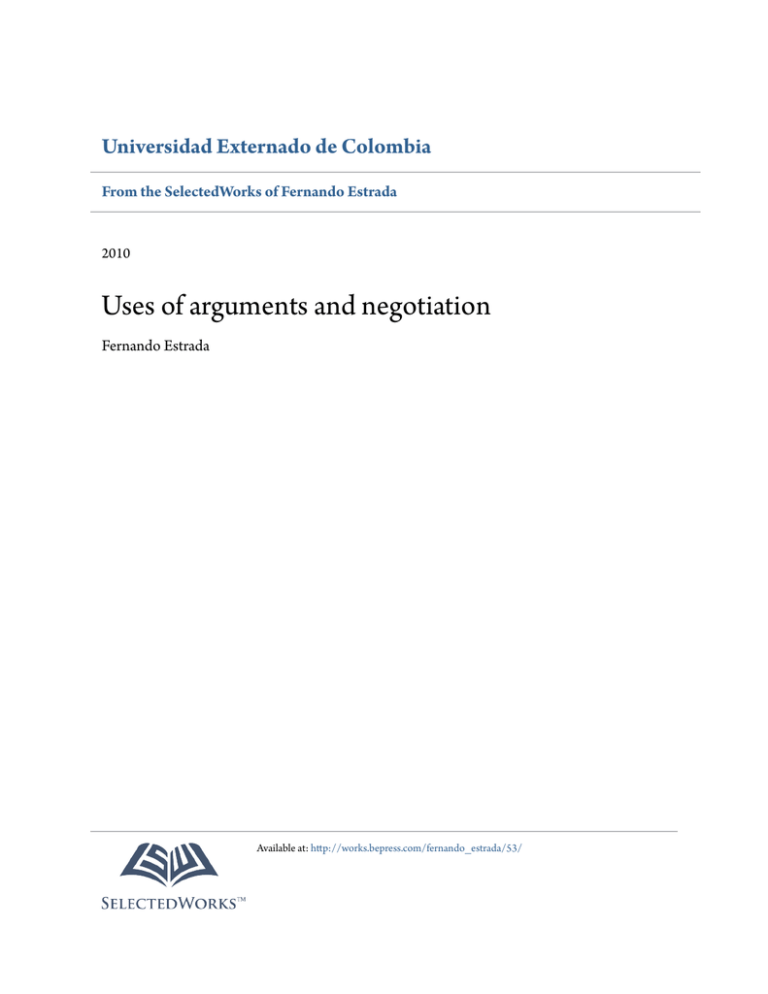
Universidad Externado de Colombia From the SelectedWorks of Fernando Estrada 2010 Uses of arguments and negotiation Fernando Estrada Available at: http://works.bepress.com/fernando_estrada/53/ USES OF THE ARGUMENTS AND NEGOTIATION Fernando Estrada Abstract In the recent literature on conflict resolution tends to underline negotiation model based on the argument or dialogue. Exchange between different styles of argument some trends have emerged in the rhetoric applied to the law, especially in procedural law. During the last decade researchers have recognized the value of the argument to understand various problems of jurisprudence in cases of conflict and strife. This paper proposes a complementary design to the analysis of the negotiation process based on debate and dialogue. It advocates a theory of argumentation in negotiation processes for instances where rational agents use strategies unpredictable with incomplete information. Keywords: Persuasion, argumentation, negotiation, conflicts and science social. 1. Introduction Recent literature on conflict resolution has given importance to the role of models of argumentation. This attention is increasingly clear in various forms of negotiation that come from alternative forms of justice with incomplete information. For example, in the field of procedural law and the new mechanisms incorporated by the penal system, the argument is central as a method to argue cases for or against. That is, the renewal of legal rhetoric reflects institutional changes that have occurred in the field of Constitutional law, DC and AI Artificial Intelligence (Pereda, 1994; Prakken 1998). However, conflict resolution is not limited to describing patterns of argumentation, but also to understand what types of rational strategies have a business when looking for the answer to a conflict. Believing that the dialogue between opponents is a peaceful succession of good intentions is to limit key aspects of the process of conflict. Analyze the components irregular trading on the field argument we broaden the view of possible solutions to the conflict. We have one case in point, the growing distrust of the Justice and Peace with the paramilitaries in Colombia is related to the above premise. It is not enough to believe that the persuasion of the opponent depends on the coherence of the arguments that are presented (omit). Or that a conflict caused by a war of long duration, as in Colombia, with deaths, displacement and loss of land, is resolved with the good intentions of the criminal organizations. The mechanisms of memory retrieval, return of property, restitution, justice and peace, have a material causal quantifiable and a moral dimension that can be measurable. And in these cases, the mediation of the dialogue by way of the arguments is relatively effective, to the extent that balances the relationship between justice and fairness to the victims. The objections to previous failed talks have a relative weight. Appealing to the dialogue and argumentation in resolution of conflict is certainly a successful strategy (Perelman, 1952, 1957, 1970, 1977, Walton 1998). The argument helps to show intentions (explicit or not), more than convincing, the argument can be used for a real chance to sit in front of opponent and face it with a rational language (Salazar-Castillo 2001). In summary, the arguments help to expose allegations publicly for or against a hypothesis which, incidentally, generated a social pedagogy for the debate in any society (Verheij, B., 1996). During the last decade researchers recognize the importance of the theory of argumentation for the negotiated resolution of conflicts (Eemeren, FH van, Grootendorst., 2003) and describe how they can be used argumentation systems during a critical phase of the negotiated process. Indeed, assessing the damage factors or to state his reasons for his participation in massacres or crimes against humanity is to outsource the phenomenon led to public debate. Moreover, at present models of argument are deployed in less extreme cases of armed conflict at the local level, involving cases where alternative forms of justice to resolve intra-family disputes or in the local community. Yes, the theory of argumentation is defining new paths for the community to better understand the content of justice and law (Prakken, H., Sarto, 1998). The purpose in our case is try to respond to the contents of the following question: What role does the argument when we are facing a negotiator selfish? That is, the question suggests two components necessarily complex, while acting as a starting point the argument dialogue: (1) The criterion of rationality (2) The agent's selfish behavior. It should show how the arguments involved in the distinctive aspects of rationality and how their selfish interests‟ negotiators nuance in the argument. However, it is intended to cover all aspects of the negotiation based on the argument. What we hold is that the argument is also an exercise in strategic rationality (Schopenhauer, A., 1997). According to the strategic rationality solves agent conflict and silence say a few things other (Apostel, Leo, 1963, 1979). The arguments are used as tools within the type depending on the circumstances of the opponent, and when the process is proper to speak or remain silent (MacCloskey, Donald, 1987). And in these cases, it is proper to describe the formal content of the dialogue. Moreover, the dialogue represents one of the most recurrent of our rationality, he must study, discuss, analyze. In this case, the analysis of the dialogue makes sense within its own conception of the legal rhetoric (Atienza, 2004) For example, it is necessary that the opponent of the argument accept the premise of which derive meaningful conclusions. This rule is necessary and desirable for an adequate rational reconstruction of the agreements. However, failures of communication between negotiators from, usually, the aspects related to the interests that lie behind the arguments. In other words, the strategic mechanisms of the argumentation, in terms of the theory of speech acts (Searle, 1989), are phenomena of the communication process to comply with indirect speech acts. This article has the following aims. Initially, described the role of rational argument in the Dialogue, the logical rules that guide the reconstruction of arguments. Then he joined an illustration of the case applied an egotistical negotiator, to show limitations of a negotiation dialogue. In the last session outlines the relationship between the logical rules of Rationality in Dialogue RLRD. Then, we analyze the case referred to in the light of the maxims of Grice's Conversational MCG (1975). 2. Rational argument The formal properties of an argument are closely related to the goals you have an argument to persuade his opponent given the conclusions from certain premises. Both the opponent and the arguments it accepts basic principles of reasoning. That is, the opponent of an argument can deny the same if you believe that the assumptions suggested by the rapporteur are false. But is it possible to reject a conclusion follows from premises that are well-defined? If the premises has presented an argument is valid, the opponent would be obliged to accept the findings. In the dialogue both parties can agree to accept platitudes. The second need: that the speaker can show how the conclusion follows from the premises in accordance with widely accepted rules of inference. The presumption here is that both parties, to begin the dialogue, they can add some rules of inference as valid or binding. In this case, the parties agree explicitly rules of propositional calculus and predicate logic with proven consistency. In another instance the arguments can adopt some rules of inductive inference as the basis of their approaches. There may be different formal models of dialogue rules depend on which participants are willing to accept as binding. But whatever the accepted standard of rationality in dialogue, formal rules should stay as a guarantee for the proper understanding. A logical rule states that if the opponent accepts the assumptions made by the arguer as likely to accept the conclusion. Strictly speaking, these rules can only govern a dialogue in which the parties accept the conditions of rationality and in which the different speech acts are guided by principles of logical inference. 3. Rule RLRD This rule refers to a general principle of rationality that can be formulated as follows: as a speaker who takes the initiative with an argument and agree jointly with the opposing principles of sound reasoning. And since, moreover, that despite this, the opponent in the dialogue refuses to accept the conclusion of the premises expressing their disagreements. Can we claim in this case, negligence or weakness of the opponent? In a reasonable argument, the premises are preparatory background with which the arguer is able to persuade the opponent of the truth of its conclusions. In other words, it is logically impossible for an opponent to accept the premises of an argument, also refuses to accept its conclusions. A rational argument, however, can doubt or contradict the assumptions of the premises or the conclusion (Roth, AC, 2003). The starting point in the dialogue depends on the logical relationship between premises and conclusions are accepted by the arguer and the audience. Only then, can be established criteria of a dispute about the validity or otherwise of a particular argument. Under this condition, the rules of rational argument will depend on the acceptance of the premises, and a dialogue that is directed by these rules will then have a normative character. This rule can be stated as follows: RLRD When a speaker advocates a valid argument with premises P = (P1, P2, ... Pn) that are recognized in the conclusion C by the opponent, the opponent can move in another dialogue, accept or reject the conclusion C, refuting a the premises. This rule requires that the opponent into question one of the premises, if not willing to accept the conclusion, although generally satisfied that the argument is valid. RLRD is a central rule called the DPF type of dialogue (dialogue of persuasion flexible) in (Perelman, Ch Olbrechts Tyteca, 1952). Flexible persuasion dialogue contrasts with the rigorous persuasion dialogue (DPR), because it admits of degrees of tolerance in the movements carried out by the rapporteur and the opponent. When you can accept or reject assumptions that are controversial. In contrast, a rigorous persuasion dialogue is much more restrictive in this regard. According to the flexible persuasion dialogue, a rule would be: "If a speaker gives to accept all the premises proposed by his opponent's argument, ie, accepts the implicit relations between the premises and conclusions. Most likely, the argument is also willing to accept the conclusions of the argument of the opponent. The "implied assertion that connects the premises and the conclusion is a logical rule, regulation or structure of the inference that goes from premises to conclusion. For example, if the argument has the form of modus ponens, it is clear that the form is deductively valid, the parties to dialogue accepting the validity of modus ponens, are committed to accept the implicit aspects of this argument. In the dialogue analysis scheme presented in this perspective has obvious methodological advantages. 4. Value judgments The practice does not always meet RLRD rational expectations. One reason for this is that in the dialogues a party can accept the premises and the argument is valid, and may even agree with the rules of composition of the argument, and nevertheless refuse to accept the conclusion. One reason for this reluctance may be because it has found an equal argument, which is opposed to the same conclusion. This situation, however, does not refute the original argument or some formal property found to be defective to the argument. We are in dispute are value judgments (Perelman 1959, 1977) In these cases, it is a dilemma, the choice of a conclusion that is not marked by personal prejudices. It is likely that the opponent does not refute or reject the formal structure of the argument, but wants to present his own version of events from premises equal, or on value judgments. In other words, the interpretation of the data corresponds to similar or parallel semantic domains. When what is being discussed with the opponent are events or facts on which moral actions are presumed. 5. Is RLRD an alternative to conflict resolution? The warring parties have several options to face possible solutions. One option with very little imagination is to leave things as they were to begin. And in these cases, if the participants are genuinely interested in resolving differences, there are a variety of alternative mechanisms to respond to the crisis caused by the conflict. The four most prominent are: (a) negotiation (b) mediation (c) arbitration and (d) litigation. The arbitration and litigation are adversative rules in which a third party intervenes to decide. Mediation and negotiation are processes of consensus in which participants are proposed as a goal to do agreements on its own initiative or with the help of a third party called: mediator or facilitator. This third party including those affected, do not seek to impose arbitrary criteria. The role of facilitator met to make sure proper ways for negotiation. In our approach, we estimate the mechanism of negotiation / mediation, highlighting some critical aspects in the specific context of a negotiation. What Estrada (2001, 2005) called the principle of negotiation, relates an exchange within a persuasive dialogue process in which an arguer intends to get his hand to accept their conclusion based on rational argument, dialogue also designed , for the statements of the participants are true. Such cases are common. For example, a landlord and a developer are negotiating the price of a concrete slab to build a second plant. The dialogue would start arguing values of materials, payment of workers, time, and so on. The owner wants high quality materials, the builder review the increase in costs. The owner internet consultation materials prices, he realizes that the costs are relatively lower than those charged by the manufacturer. This type of argument of rational persuasion in which the conclusion leads to resolve dilemmas of regulatory and where the premises are used to prove that the conclusion follows from a given source of authority, are problematic. This means: what can happen in cases like this, is that questions arise about the premises asserted that much affect confidence in the conclusion. The premises that support the conclusion contain controversial reasons. In a dialogue whose purpose is to reach agreements by the existence of various conflicts of interest, general conditions have been discussed in RLRD, are necessary but not enough. Sometimes these exchanges in persuasive negotiation may have fewer advantages than the quality and the original terms of a dialogue, whose goal is negotiation. In cases such as allegations in the custody of the children, the negotiations can be carried out in the midst of heated clashes between the parties, which may lead to practical dilemmas. If the mediator got a kind of discussion where the terms of trade become more impersonal and shown the importance of the dignity of the child, the discussion could come to have a tone better and less aggressive. Specifically, the reason is that the objective evidence is required to give to solving the problem. This is mainly to emphasize not so much the particular interests but what is more right. That is, ell change from negotiation toward a persuasive dialogue, in which it is possible to show true and false aspects, it is important to resolve negotiations at an early stage of dialogue. Moreover, this is the change of perspective that a mediator be encouraged. When you have a persuasive dialogue as an alternative to negotiating conflict, we can say that the principle has been applied RLRD. And in the interludes of this dialogue, the parties should be willing to listen to reason that promote greater clarity on the premises that best reinforces certain evidence. To make the agreements, it is important to be attentive to the first phase in which the parties are better equipped in such and such issues to respond. Thus, a degree of rationality has benefits for the arguments which may give the parties. This means, one of the hypotheses that can be sustained, is that the principle RLRD applicable as an alternative method for resolving conflicts at an early stage. In short, the prevailing literature on negotiations, the principle of rationality is more important than is recognized. A principle of rationality is crucial to discuss dilemmas of the conflict when things do not seem to go anywhere. Obviously, the principle RLRD plays a role not always ideal, the parties may refuse to cooperate or be satisfied, each on his side. The restrictions that may arise to make sure arrangements are diverse. An argument can be any reason that they have adequate justification, as many as those presented also the opponent. Each party can discuss the rationality of their premises, reaching different conclusions. According to the concept of Kuhn (1972), the parties might be thought that run through the evidence from paradigms incommensurable. References Ashley, K. D., 1990. Modeling Legal Argument: Reasoning with Cases an Hypotheticals. Cambridge: MIT Press/Bradford Books. Apostel, Leo, 1963. “Rhetórique, psico-sociologie et logique”, en: Logique et Analyse (Nouvelle Serie), N°. 21 –24. Apostel, Leo, 1979. “What is the force of an argument?”, en: Revue Internationale de Philosophie, N°. 127 –128. Bhagwati, J. y H. E. Daly, 1994. “Debate ¿El libre comercio daña el ambiente?”, Investigacion y Ciencia, Barcelona, Prensa Científica. Bejarano, J. A. 1999. “Los costos económicos y las soluciones políticas de paz”, en: La guerra y la paz en la segunda mitad del siglo xx en Colombia, Bogotá, ecoe. Clausewitz, K. von. 1984. De la guerra, Barcelona, Labor. Dascal, M. 1997. “Observaciones sobre la dinámica de las controversias”, en: Racionalidad y cambio cientifico, Barcelona, Paidós. Dascal, M. 1995. “Epistemología, controversias y pragmática”, en: Isegoria 12. Dijk, T. A. van. 2000a. El discurso como estructura y proceso, Barcelona, Gedisa. Dijk, T. A. van. 2000b. El discurso como interaccion social, Barcelona, Gedisa. Dung, P. M. 1995, “An argumentation theoretic foundation of logic programming”, en: J. Logic Programming, 22, pp. 151–177. Engelhard, Jr., y A. Caplan. 1987. Scientific Controversies: Case Studies in the Resolution and Closure of Dispute of Science and Technology, Cambridge, Cambridge University Press. Eemeren, F.H. van, Grootendorst., 2003. A sistematic Theory of Argumentation, Cambridge University Press. Eemeren, F.H. van, Grootendorst, R., Jackson, S., & Jacobs. S. 1993. Reconstructing Argumentative Discourse. Tuscaloosa / London: The University of Alabama Press. Estrada G., F. 2001. “Discurso paramilitar”, Analisis Politico, Bogotá, iepri, Universidad Nacional de Colombia, diciembre. Estrada G., F. 2005. “Dialéctica de la argumentación económica”, Revista Economia Institucional, vol. 7, Nº 12, Primer Semestre / 2005, Bogotá, Universidad Externado de Colombia. Fleck, L. 1986. La genesis y el desarrollo de un hecho cientifico, Madrid, Alianza; edición original de 1935. Foucault, M. 1986. Historia de la sexualidad 2, El uso de los placeres, México, Siglo xxi. García, R. y G. Patiño. 1998. “Reflexiones conceptuales sobre ordenamiento territorial ambiental”, Utopia, 8, Popayán, septiembre, pp. 17-25. Garssen, B., 2001, “Argument Schemes”, en F.H. van Esmeren (eds), Crucial Concepts in Argumentation Theory, Ámsterdam University Press, pp. 81 – 89. Geertz, C. 2000. Negara, el Estado–teatro en Bali del siglo xix, Barcelona, Paidós. Gómez Buendía, H., (1999) (Compilador), .Para donde va Colombia?, TM Editores, Colciencias. Grice, Paul, 1975, „Logic and Conversation‟, in The Logic of Grammar, D. Davidson and G. Harman (eds), Encino, CA: Dickenson, 64-75. Reprinted in SWW. Gross, A. G., 1990. The Rhetoric of Science,Cambridge, ma, Harvard University Press. Hayek, F. A., 1992. The Fatal Conceit. The Errors of Socialism, Chicago, University of Chicago Press. Heilbroner R. y Milberg, W. 1998. La crisis de vision en el pensamiento economico moderno, Barcelona, Paidós. Hicks, J. 1988. Una teoria de la historia economica. Barcelona, Orbis Editores, S.A. Horty, J. F., 2001. “Nomonotonic logic”, en L. Goble (ed.), The Backwell Guide to Philosophical Logic, Blackwell Publishers, Dordrecht/Boston/London. Hirschman, Albert O., 1999. Las pasiones y los intereses, argumentos politicos a favor del capitalismo previos a su triunfo, Barcelona, Península, pp. 175. Hirschman, Albert., 2001. Retoricas de la intransigencia, Fondo de Cultura Económica, México. Jacobs, M. 1991. Economia verde, medio ambiente y desarrollo sostenible, Bogotá, tm Editores, Uniandes. Johnson, Mark. W., Simon Parson, 2005. “A Mathematical Model of Dialog”, in Electronic Notes in Theoretical Computer Science, 141, pp. 33–48. King, A. y B. Schneider, 1992. La primera revolución global: Informe del Consejo al Club de Roma, Barcelona, Círculo de Lectores, S.A. Kuhn, Thomas S., 1972. Estructura de las revoluciones cientificas, México, Fondo de Cultura Económica. Lackoff, G., 1988. Metaforas de la vida cotidiana, Cátedra, Madrid. Lakoff, G., M. Johnson, 1999. Philosophy in the Flesh, New York, Basic Books. Lorenzen, P. and Kuno Lorenz, 1978. Dialogische Logik, Darnstadt, Wissenschaftliche Buchgesellschaft. Perelman, Ch., Tyteca Olbrechts, 1952. Rhetorique et Philosophie. Pour une theorie de l´argumentation en philosophie. En collaboration avec L. Olbrechts-Tyteca. Préf. De É. Bréhier. Paris. P.UF., Boblitheque de Philosophie Contemporaine, 1952. (Reimp. 2003) 161 p. Contient les articles n° 21, 24, 25, 28, 29, 30, 32, 38. Perelman, Ch., Tyteca Olbrechts, 1958. Traite de l´argumentation. La Novelle Rhetorique, en collaboration avez L. Olbrechz-Tyteca. Paris. P.U.F., Collection Logos. 2 vol., 734 p.; 2 éd. 1970, Editions de l´Institut de Sociologie. Université de Bruxelles, collection Sociologie genérale et philosophie sociale; 3 éd. 1976, Éditions de l´Université de Bruxelles, I vol., 734 p. Perelman, Ch., Tyteca Olbrechts, 1977. L´Empire rhetorique – Rhetorique et Argumentation. Paris. J. Vrin, Collection “Pour Demain”. 193 pp. Kalmanowitz, S., 1999. “El debate debe continuar”, en: Cuadernos de Economia, Bogota, Universidad Nacional. Kuhn, T. S., 1972. La estructura de las revoluciones cientificas, México, Fondo de Cultura Económica. MacCloskey, Donald, 1987. Si eres tan listo, Madrid, Editorial Alianza. Pereda, C., 1994. Vértigos argumentales, Barcelona, Anthropos. Pollock, J.L., 1995, Cognitive Carpentry: A Blueprint for How to Build a Person. The MIT Press, Cambridge, Massachusetts. Prakken, H., Sarto, 1998. “Modelling Reasoning with Precedents in a Formal Dialogue Game”, en: Artificial Intelligence and Law, Volume 6, pp. 231–287. Rangel, Alfredo, 1998. Colombia: guerra en el fin de siglo, Bogotá, TM Editores. Rescher, Nicholas. 1995, La lucha de los sistemas, México, Universidad Nacional Autónoma, Instituto de Investigaciones Filosóficas, pp. 387. Roth, A.C., 2003. Cased – based reasoning in the law. A formal theory of reasoning by case comparison. Dissertation Universiteit Maastricht. Rubinstein, Ariel. 2000. Economics and Language, Cambridge University Press, pp. 128. Salazar, Boris, 1996. “Jugando a la violencia en Colombia”, en: Cuadernos de Economia, 25, Bogotá, Universidad Nacional. Sartori, G., 1998. La comparacion en las ciencias sociales, Madrid, Alianza. Schopenhauer, A., 1997. Dialectica eristica, Madrid, Trotta. Schumpeter, J. A., 1968. Ensayos, Barcelona, Oikos Tau S.A., Ediciones, pp. 25-49. Searle J., 1989. Speech Acts, Cambridge, University Press Cambridge, 1969. trad. Española, Actos de habla, Editorial Cátedra, Madrid. Sen, A., 1997. Sobre la desigualdad economica, Barcelona, Folio. Sen, A., 2000. Desarrollo y libertad, Bogotá, Planeta. Smith, Adam, 1983. Teoria de los sentimientos morales, México, Fondo de Cultura Económica, pp. 166. Stettler, 1995. “The rhetoric of Mc Closkey´s rhetoric of economics”, Cambridge Journal of Economics, 1995 Academic Press, Inc. Copyright 1995 by Oxford University Press, pp. 391 – 403. Toulmin, S. E., 1958. The Uses of Argument, Cambridge, M.A: Cambridge University Press. Tugores, J., 1997. Economia internacional e integracion economica, Madrid, McGraw Hill. Wright, G. H. von, 1979. Explicacion y comprension, Madrid, Alianza. Vaz. Ferreira. Carlos, 1985, La logica viva, moral para intelectuales, Caracas, Venezuela, Editorial Andrés Bello. Verheij, B., 1996, “Two approaches to dialectical argumentation: admissible sets and argumentation stages”, Presented as report SKBS/ B3.A/96-01.

